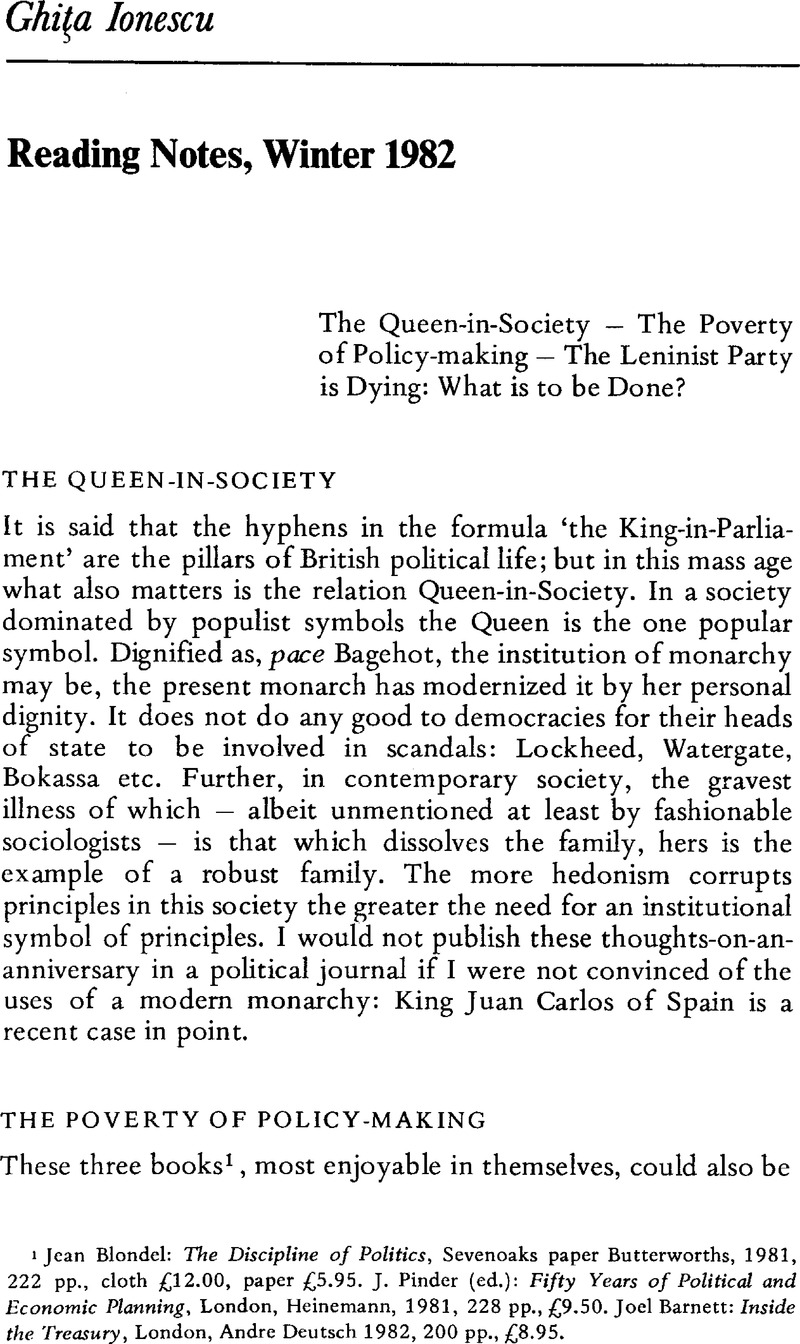No CrossRef data available.
Published online by Cambridge University Press: 28 March 2014

1 Blondel, Jean: The Discipline of Politics, Sevenoaks paper Butterworths, 1981, 222 Google Scholar pp., cloth £12.00, paper £5.95. Pinder, J. (ed.): Fifty Years of Political and Economic Planning, London, Heinemann, 1981, 228 Google Scholar pp., £9.50. Barnett, Joel: Inside the Treasury, London, Andre Deutsch 1982, 200 pp., £8.95.Google Scholar
2 The uncharacteristically frivolous remark of the young Brian Barry about the uselessness of ‘rolling the classics around the tongue like old brandy’ had better be forgotten.
3 ‘From the outset I had great trouble with the TUC. Unlike the Cabinet they simply refused to accept that cash limits were sensible’ (p. 78). ‘It was yet another example of our concern not to upset the TUC, whilst they for their part offered little in return’ (p. 94).
4 In an interview I gave to the BBC External services on 16 December 1981, three days after the Polish military coup, the interviewer asked the following question: ‘In your book published in 1967, called The Politics of the European Communist States you propose a theory of the apparats. You define an apparat as being any centralistic organization which in an oppositionless state holds or shares with other apparats a set of coercive powers. In the East European context can one actually talk of the army having a separate existence?’ I answered as follows: ‘What is happening now (in Poland itself) is that there is a fight between three apparats. We know that the Church is very powerful and probably the most influential. We know that the trade union apparat is very active but is for the time being in opposition. And we know that the Army apparat has come to power. But what really surprises me is how little we notice that there is a big corpse in Polish politics: that is the (Workers) Party and the Party apparat. Because the Party is now dead the other three apparats in Poland are waging a struggle and trying perhaps to be reconciled themselves in order to save Poland. But the big vacuum in Polish politics now is the Party, is that of the Party which has volatilized’. (My italics.) See also my Reading Notes in this journal during 1981.
5 ‘For good measure he [President Reagan] has blamed it all on the Russians’, wrote Ian Davidson as early as 19 December 1981 in the Financial Times explaining rather sarcastically that by doing so the President ‘has been able to earn kudos by standing up for human rights and at the same time he has been able to get credit from America's New Right’.
6 ‘The Socialist leaders do their utmost to expose the responsibility of the USSR or the immobilism of the French C. P.’Le Monde, 24 December 1981.
7 The Bonn correspondent of Le Monde surmised that one of the reasons for Chancellor Schmidt's unexpected visit to Paris on 13 January was ‘the attitude of the French press which causes here indignation. The Chancellor himself was outraged by cartoons showing him polishing Mr Brezhnev’s boots'.
8 See my Reading Notes in this journal, Volume 16 no. 1, 1981, p. 97.
9 In a recent letter to The Times with reference to one of Michael Binyon's excellent Moscow despatches I said that if ‘he implied that the political leadership is in the hands of the official leaders of the CPSU, I think that this was true yesterday and may be only partly true today’ and explained that the ‘military’ members of the Politbuto are those who preferred to help Jaruzelski rather than Gierek or Kania, the Party Secretaries. I was gratified to see that in his despatch of 11 January 1982, Michael Binyon also concluded that ‘In spite of ‐and maybe because of ‐the growing influence of the military forces within the Soviet Union itself, the Soviet party leadership cannot but be alarmed by the virtual abolition of the Polish Party.’